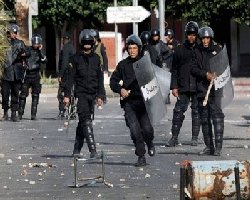Police have fired into the air to disperse rioters ransacking buildings in a suburb of Tunisia's capital.
The violence in the predominantly working class neighborhood of Ettadem late on Tuesday was the first in Tunis since a wave of unrest that has killed at least 23 people, according to officials.
A reporter for the Reuters news agency said that hundreds of youths threw stones at police before smashing shops and setting fire to a bank.
He said the crowd had blocked the roads with burning tires, set fire to a bus and two cars and also set fire to a local government office.
"We are not afraid, we are not afraid, we are afraid only of God," the crowds chanted.
As well as warning shots, the police fired tear gas grenades to try to force people back.
Tunisia has been hit by a series of riots by protesters saying they want action to create more jobs and better living conditions.
The army had been deployed in the most restive towns on Tuesday and schools and universities closed after a weekend of violence.
Weekend casualties
The Paris-based International Federation for Human Rights (FIDH) said that at least 35 people were killed in violence over the weekend after security forces shot at demonstrators, prompting international calls for restraint.
"We have a list of the names of the 35," Souhayr Belhassen, FIDH president, told the AFP news agency.
"The total figure is higher. It's somewhere around 50, but that's an estimate."
However, authorities have rejected the human rights group's allegations, adding that security forces acted in self-defense.
"All other figures given by television and agencies which talk about 40 or 50 [dead] are totally false," Samir Labidi, the communications minister, said.
"Religious extremist movements and extremist movements from the left have infiltrated these protests and pushed for violence.
"Our response to the demands of the young people is economic and social reforms and more opening up towards liberty."
Belhassen said the toll had "increased tragically" after the protests at the weekend in Regueb, Thala and Kasserine - remote, agricultural areas with high rates of youth unemployment - and that so many had been wounded that "they can't be counted".
The organization follows events in tightly controlled Tunisia, criticized for its rights record, through a network of local monitors.
Another international watchdog, Amnesty International, has estimated that 23 people were "killed by security forces" during the protests against the government on Saturday and Sunday.
Rare protests
Protests traditionally have been rare in Tunisia, which has had only two presidents since independence from France 55 years ago.
The European Union, France, the United Nations and the United States have expressed alarm and called on President Zine El Abidine Ben Ali's government to show restraint.
The unrest prompted Ben Ali to announce the creation of 300,000 jobs in a televised address on Monday, on top of 50,000 already pledged for the regions.
He also called a national conference on employment for February.
Tunisia's unemployment rate is officially 14 per cent, but the percentage of graduates without work is reported to be double of that.
PHOTO CAPTION
Tunisian security forces personnel react during clashes with demonstrators in Regueb, near Sidi Bouzid on January 10.
Al-Jazeera


 Home
Home Discover Islam
Discover Islam Quran Recitations
Quran Recitations Lectures
Lectures
 Fatwa
Fatwa Articles
Articles Fiqh
Fiqh E-Books
E-Books Boys & Girls
Boys & Girls  Ramadan
Ramadan Fatwa Audios
Fatwa Audios Month of Mercy
Month of Mercy Women
Women Eed Al- Fitr
Eed Al- Fitr Food Recipes
Food Recipes Videos
Videos

 Prayer Times
Prayer Times












